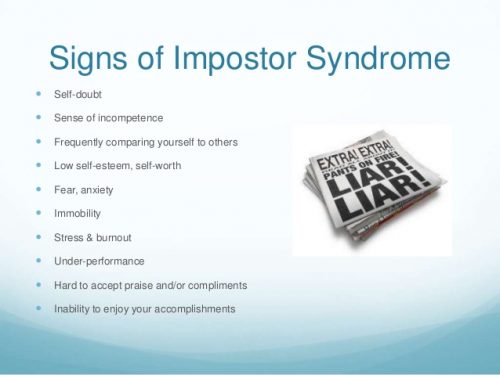Accompanying with promotions and achievements, it is quite common for individuals to second guess themselves. Questioning whether their success is well deserved or merely a stroke of luck. They would feel that they are playing a role and they are incompetent and not knowledgeable enough to handle managerial and top positions. These feelings of doubt, fraud, and incompetence are labeled as impostor syndrome. The term was introduced by clinical psychologists Pauline R. Clance and Suzanne A. Imes in 1978 (Eapsweb.mit.edu, 2018).

source: mentalfaculties.files.wordpress.com
Not significantly a mental illness, rather a personality trait that dominates in a person who is accomplished in their field. “Past positive or neutral thoughts become “I am incompetent,” “I suck at everything,” or “I hate myself,’” according to clinical psychologist Dean Parker, Ph.D. The problem is that they cannot accept this success and continuously carries the fear of being subjected to falsehood. In several studies conducted to understand this condition, this is mainly common among successful women like Sheryl Sandberg and Maya Angelou. Remarkably, 70 percent of the general population conveyed that they feel like impostors or frauds themselves.
Common Traits
Persistence
These people have stringent work ethics. They work hard to maintain and prove that they are the real thing. However, the irony is the more work they place, the more accomplished they become, and this becomes a cycle to cover the “fraudulent” acts. This leads to physiological complications such as sleeping problems, particularly insomnia, over fatigue and eventually burn out.
Feeling Pretentious
Despite the continued feeling of being a fake, these persons frequently offer the solutions or information they believe what the people wanted to hear. With this effort, they feel that they are putting a phony character and this just fuels up the condition
Use of charisma
Women who possess exceptional skills to make people agree or believe in them often thinks that they used their charm and not their cognitive or intellectual capabilities.
Discernment towards overconfidence
The problem with a person having impostor syndrome is that they are not able to display much confidence in themselves for fear that others may not follow or believe them. The constant fear of rejection hovers in their mind, and they will resort to just settle on the thoughts that they are not intelligent or capable of providing excellent service.
Since it is not considered as a mental disorder, it doesn’t have clear treatment options. In fact, some experts believe that the experience of feelings of the impostor is healthy and beneficial for the person’s career path. This is founded on the understanding that everyone has a comfort zone and growth is likely to occur when one moves away from their comfort zone.
According to career coaches, here are ways to fight against impostor syndrome.

source: slideshare.net
Acceptance and Awareness
Learn to accept that almost everyone experiences this syndrome at some point. Be aware of your thoughts and once you identified that you doubt your achievements; find alternative and positive thoughts. “Surround yourself with people who celebrate your strengths, not your weaknesses,” Deborah Serani PsyD said.
Take A Look At Your Resume
Allot specific time each month to work on your resume. Reflect on your accomplishments critically.
Develop Affirmations
Utilize positive affirmations to develop the appropriate amount of self-love and confidence. “If you think your self-esteem is shattered, work with a therapist to build it back up. It’s never too late to feel good about yourself.” – Margarita Tartakovsky, M.S.
Avoid Perfection
Do not strive for perfection because this aim will only leave you frustrated.
Identify the Root
Find the root cause of the feelings of incompetence and work on these internal issues.
Reference:
Eapsweb.mit.edu. (2018). MIT’s ‘Impostor Syndrome’ Workshop Draws A Full House | MIT Department of Earth, Atmospheric and Planetary Sciences. [online] Available at: https://eapsweb.mit.edu/news/2017/wixii-impostor-syndrome-workshop [Accessed 1 Feb. 2018].